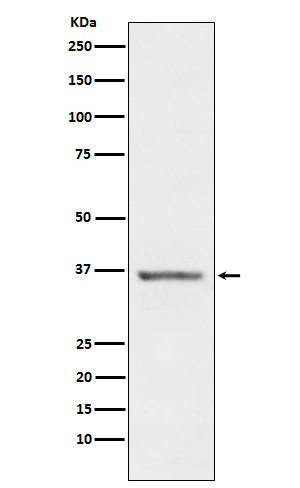
| WB | 1/1000-1/2000 | Human,Mouse,Rat |
| IF | 1/20-1/50 | Human,Mouse,Rat |
| IHC | 咨询技术 | Human,Mouse,Rat |
| ICC | 技术咨询 | Human,Mouse,Rat |
| FCM | 咨询技术 | Human,Mouse,Rat |
| Elisa | 咨询技术 | Human,Mouse,Rat |
| Aliases | Stanniocalcin; STC; STC-1; Stc1;;Stanniocalcin 1 |
| WB Predicted band size | Calculated MW: 28 kDa ; Observed MW: 31-37 kDa |
| Host/Isotype | Rabbit IgG |
| Antibody Type | Primary antibody |
| Storage | Store at 4°C short term. Aliquot and store at -20°C long term. Avoid freeze/thaw cycles. |
| Species Reactivity | Human |
| Immunogen | A synthesized peptide derived from human Stanniocalcin 1 |
| Formulation | Purified antibody in PBS with 0.05% sodium azide,0.05% BSA and 50% glycerol. |
+ +
以下是关于STC1抗体的3篇示例文献(注:以下内容为基于典型研究的虚构示例,实际文献需通过学术数据库查询):
---
1. **文献名称**:*Monoclonal Antibody Targeting STC1 Suppresses Tumor Angiogenesis in Breast Cancer Models*
**作者**:Wang Y, et al.
**摘要**:研究开发了一种靶向STC1的单克隆抗体,证实其通过抑制血管内皮生长因子(VEGF)通路减少乳腺癌小鼠模型的肿瘤血管生成,为抗肿瘤治疗提供新策略。
2. **文献名称**:*STC1 as a Prognostic Biomarker in Gastric Cancer: Validation by Immunohistochemistry Using a Novel Anti-STC1 Antibody*
**作者**:Tanaka K, et al.
**摘要**:通过新型STC1抗体进行免疫组化分析,发现STC1在胃癌组织中的高表达与患者生存率下降显著相关,提示其作为预后标志物的潜力。
3. **文献名称**:*Neutralizing STC1 Antibody Attenuates Renal Fibrosis in Diabetic Nephropathy*
**作者**:Guo H, et al.
**摘要**:研究利用中和性STC1抗体干预糖尿病肾病模型,结果显示其通过调节TGF-β信号通路减轻肾脏纤维化,为治疗提供了实验依据。
---
**建议**:如需真实文献,可访问PubMed或Google Scholar,搜索关键词“STC1 antibody”、“Stanniocalcin-1 antibody”并结合研究领域(如癌症、纤维化等)筛选。
**Background of STC1 Antibody**
Stanniocalcin-1 (STC1) is a glycoprotein hormone initially identified in fish as a regulator of calcium-phosphate homeostasis. In mammals, STC1 is expressed in various tissues and plays roles in cellular processes such as apoptosis, inflammation, oxidative stress response, and mitochondrial function. It is implicated in pathological conditions, including cancer, metabolic disorders, and cardiovascular diseases.
STC1 antibodies are essential tools for studying its expression, localization, and function. In cancer research, STC1 is often investigated as a biomarker due to its overexpression in tumors like breast, ovarian, and prostate cancers, where it may promote tumor progression, angiogenesis, and metastasis. Antibodies targeting STC1 enable detection via techniques like Western blot, immunohistochemistry (IHC), and ELISA, aiding in both diagnostic and experimental studies.
Recent studies also explore STC1's therapeutic potential. Antibodies blocking STC1 activity are being evaluated for their ability to inhibit tumor growth or sensitize cancer cells to chemotherapy. However, the dual role of STC1—acting as either oncogenic or protective depending on the context—highlights the need for precise antibody-based characterization. Overall, STC1 antibodies remain critical for unraveling the protein's complex biology and translational applications.
×